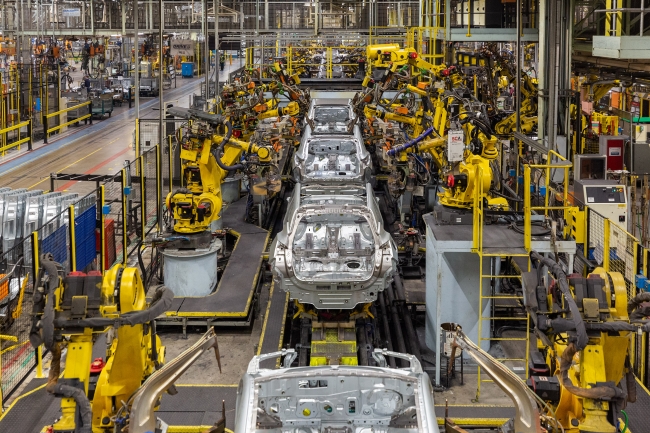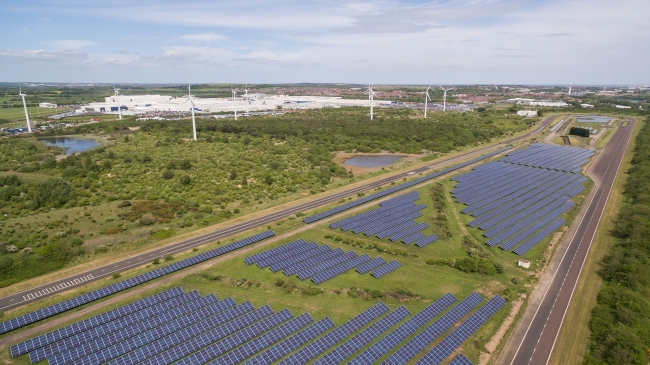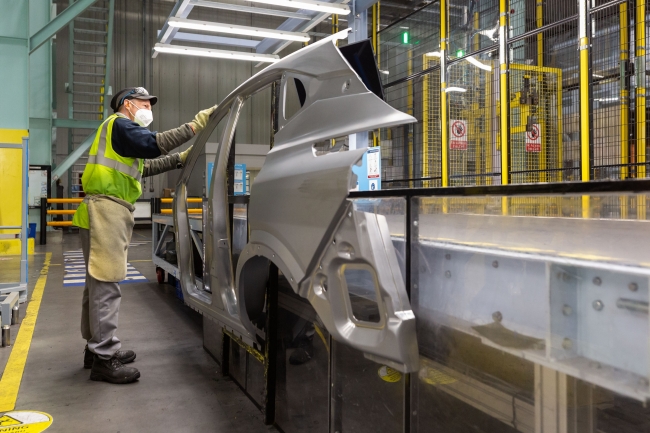4 minute read - 1st July 2021
Nissan announces £1bn UK investment
Nissan has unveiled a £1bn investment in electric vehicle production, creating a world-first EV manufacturing ecosystem, which it says heralds the next phase of Nissan’s electrification plan and its UK operations.
The transformational project will include a new low-carbon battery gigafactory in Sunderland, production of a new-generation all-electric model in the UK, and the creation of 1,650 new jobs.
The new electric vehicle hub, called Nissan EV36Zero, will be centred around its existing Sunderland plant, modernising and expanding Nissan’s electric vehicle production capability in the UK and establishing a new 360-degree solution for zero-emission motoring.
Consisting of three interconnected initiatives, Nissan EV36Zero brings together electric vehicles, renewable energy and battery production. The project has been launched with an initial £1bn investment by Nissan and its partners Envision AESC and Sunderland City Council.

Nissan has announced a £1bn investment in a new battery gigafactory and new EV model to be built in Sunderland / Picture: Nissan GB
Nissan president and chief executive officer, Makoto Uchida, said: “This project comes as part of Nissan’s pioneering efforts to achieve carbon neutrality throughout the entire lifecycle of our products. Our comprehensive approach includes not only the development and production of EVs, but also the use of on-board batteries as energy storage and their reuse for secondary purposes.
“Our announcement today comes out of lengthy discussions held within our teams, and will greatly accelerate our efforts in Europe to achieve carbon neutrality. The experience and know-how gained through the project announced today will be shared globally, enhancing Nissan’s global competitiveness. Nissan will continue to leverage its strengths in electrification to become a company that continues to provide value to its customers and society.”
Nissan’s chief operating officer, Ashwani Gupta, added: “This is a landmark day for Nissan, our partners, the UK and the automotive industry as a whole. Nissan EV36Zero will transform the idea of what is possible for our industry and set a roadmap for the future for all.
“We reached a new frontier with the Nissan LEAF, the world’s first mass-market all-electric vehicle. Now, with our partners, Nissan will pioneer the next phase of the automotive industry as we accelerate towards full electrification and carbon neutrality.”

Battery manufacturer Envision AESC will build a new 9GWh-capacity gigafactory equipped with state-of-the-art battery technology / Picture: Nissan GB
Nissan’s new-generation electric crossover
As part of the £1bn announcement, Nissan will invest up to £423m to produce a new-generation all-electric vehicle in the UK. Building on the worldwide success of the Nissan LEAF, it promises next-generation vehicle styling, efficiency and battery technology, making the switch to electric driving even more accessible.
Designed for global markets, UK production will be exported to the European markets traditionally served by Nissan’s Sunderland plant. The new crossover will be built on the Alliance CMF-EV platform, with a forecasted production capacity of up to 100,000 units to be installed.
Production in Sunderland will create 909 new jobs at the plant, and more than 4,500 in the UK supply chain, while safeguarding a further 75 R&D jobs. The transformational project takes the total capital investment by Nissan into the plant past £5bn.
The next-generation of electric vehicle batteries
Envision AESC, the battery arm of global green tech company Envision Group, already owns and operates Europe’s first battery plant in Sunderland, established in 2012 for the localisation of Nissan LEAF battery production. The factory’s UK team has nine years’ expertise from supplying batteries to the Nissan LEAF and eNV200, having produced enough cells, modules and packs to power over 180,000 electric vehicles in 44 countries.
Supporting this new model allocation, Envision AESC will invest £450m to build the UK’s first gigafactory on the International Advanced Manufacturing Park (IAMP), adjacent to the Nissan plant, powered by renewable energy and pioneering next-generation battery technology.
The formal planning process is about to begin for the new gigafactory, which represents an initial 9GWh plant, with potential future-phase investment of £1.8bn by Envision AESC, generating up to 25GWh and creating 4,500 new high-value green jobs in the region by 2030, with potential on site for up to 35GWh.
The new gigafactory will provide batteries to power up to 100,000 Nissan electric vehicles a year. It will create 750 new jobs and safeguard the jobs of 300 current employees.
It is hoped the new plant will increase the cost-competitiveness of EV batteries produced in the UK, including through a new Gen5 battery cell with 30% more energy density which improves range and efficiency.
Lei Zhang, founder and chief executive officer of Envision Group, said: “This commitment builds on our long-term partnership with Nissan to achieve our global ambition to make high performance, longer range batteries for EVs affordable and accessible for millions more motorists.
“Growth in demand could bring future investment of up to £1.8bn, additional capacity of 25GWh and 4,500 jobs by 2030. This will put the North East at the heart of a new EV hub in the UK, collaborating on R&D around the whole battery lifecycle, from storage, to second life use, V2G smart charging and closed loop recycling.”

Both Nissan and Envision AESC will create new jobs in Sunderland as well as thousands more in the supply chain / Picture: Nissan GB
Renewable energy
In addition, Sunderland City Council is leading a project that aims to deliver a 100% renewable electricity ‘Microgrid’ that will save 55,000 tonnes of carbon annually.
With the ability to incorporate the existing Nissan wind and solar farms, initial plans suggest there could be as many as ten solar farms created, with an anticipated 132MW generation, and with a direct connection to renewable energy from the UK grid for ‘firm’ supply to Nissan and automotive companies located on the adjacent International Advanced Manufacturing Park (IAMP). Plans will continue to be developed in close discussion with potential private sector green investors.
A first-of-its-kind, this project is estimated to be an £80m investment and also includes plans for a 1MW battery storage system using second-life Nissan/Envision AESC batteries, which will also allow for excess energy generated during daylight hours to be captured and used at another time, helping to balance demand on the grid. Additional infrastructure projects enabling the creation of the new EV hub take the total initial investment above £1bn.